This month’s Bloggers4Peace challenge is to write a post about inspiring peace in our children. I don’t have kids, but I understand them. I know kids. I also know the most effective way to teach a child something is to break down your lesson into the smallest pieces possible.
That said, some words are too small for the concepts they contain. It gives the illusion that the concept is already small enough to be digestible. Peace is one of those words. It reminds me of Chris Farley’s skit about fat men in little coats.
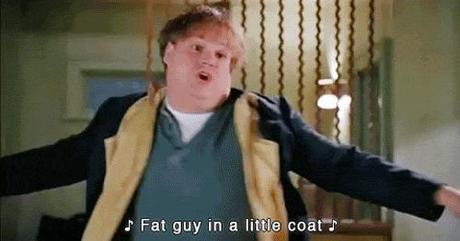
With that thinking in mind, the best way to teach a child the inner workings of peace would be to lose the pretext of the coat, chop the fat guy up into a lot of pieces, and spoon feed the remains.
… sorry, that metaphor got weird.
My point is that peace is a very big concept. You can’t just throw a concept that size at a child and expect them to understand it entirely. It’s like throwing an elephant at them and expecting them to catch it.
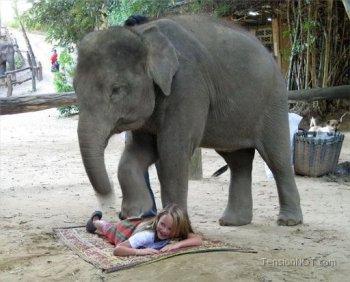
Don’t worry, this girl is getting a massage. No one threw an elephant at her. (On an added note, thanks to thoughts from a fellow blogger, I’d like to mention that if you want to worry, you can worry about the elephant. When they train these guys to massage, it is usually through cruel practice. Peace to our animal friends.)
Off the top of my head, there are three major subcategories of peace that I was taught at a very young age. When I hit my 20′s, I started to see my friends struggle with their own grasp and understanding of these concepts. They hadn’t been taught these basic principles of peace in their youth, and were forced to find their way to understanding on their own. It’s a more tangled path when you are older.
Again, I don’t have children and I don’t know exactly how my parents managed raising six, but here are some thoughts on the three peaces I was raised on, and one I wished I had learned.
Self Peace
Self peace is being able to look in the mirror and smile. Your reflection on the outside is the person on the inside, and that person is exactly the person you want to be. Self peace isn’t just about physical appearance, it is the ability to be comfortable enough to be alone with yourself.
- My parents never said, “Will you be okay on your own for a few minutes?” when I waited somewhere. Instead, they often said things like, “Think of as many things that are red as you can.” or “Don’t think too hard while I’m gone.” The first time a neighbor’s parent asked me if I’d be okay for a moment, I wasn’t sure what she meant. Why wouldn’t I be okay in my own mind? Alone doesn’t mean lonely, alone doesn’t mean bored– not if you’re happy spending time with yourself.
- The book (and movie), The Help, features a nanny with a great mantra– “You is kind, you is smart, you is important.” Ignoring the frightful grammar for a moment, this is what a salesperson would call an Assumption Close. I grew up hearing very similar things from my parents. It didn’t occur to me to doubt my importance, my intelligence, or my kindness until I was much older. By then, I was already in the habit of feeling important, smart, and kind– and trying to live up to those words.
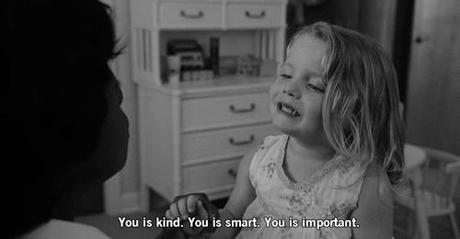
Earth Peace
Earth peace is learning how to live in peace with Mother Earth. It’s about environmentalism, consequence, respect of other types of life, and responsibility.
- Children’s entertainment focuses heavily on these concepts and my parents always took the time to reinforce the concepts. Children learn about consequences when learning what happens when you give a mouse a cookie, they learn respect for all creatures through a wise lion king, and they grasp the cornerstones of environmentalism when a brave little Lorax speaks for the trees. It’s easy to write these concepts off as silly stories, but when they are constantly reinforced at random times, the message sticks.
- When I was 6, my parents and I were spending the day at a park– just us three– after I had a dentist appointment in the middle of the day. We noticed a teenage boy throwing pebbles at the fish and ducks in the pond. I looked away. My father asked me what I thought the ducks would say about the boy. I said that I’d bet the ducks would say he was mean. My father then asked, if I was so sure they were upset, why I thought they weren’t saying anything. “They can’t speak. Ducks don’t know words.” I explained to my father carefully. “Ah,” he said, “Imagine if someone was throwing rocks at your brothers. They don’t speak either. It’s too bad no one here cares enough to speak for those who can’t.” The idea was appalling and I asked my parents if I could go over and talk to the boy. I did, he stopped, and I never looked away from something like that again. In retrospect, I wonder how many poor ducks were pelted as I worked my way around the concept that I was responsible and how aggravating it must have been for my parents to wait for me. They aren’t normally the type to sit by. Though I’m sorry for the ducks, I’m grateful for my the patience of my parents. It’s a tough love lesson that formed a pinky swear between myself and Mother Earth– we’ll protect each other, and we’ll stand up for peace.
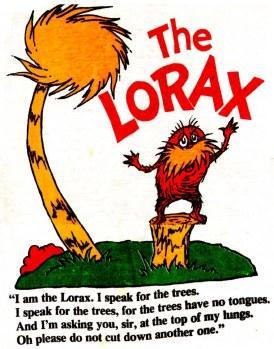
World Peace
World peace is the idea that everyone shares this planet, so we are family and we should be at peace with each other. Family squabbles, of course, but we are a unit. We are one. World peace is the idea that no faith, or lack of faith, or race, or height, or custom, or hair color should have any impact on someone’s right to be who they are.
- This I learned through celebration and example. We celebrated every holiday. My parents were friends with every culture imaginable, and every weekend we were hiding eggs, throwing paint, setting fireworks, eating cake, decorating trees, lighting candles, or telling stories. Kids love to celebrate. To this day, if you ask me for my thoughts on any culture/race/religion, I’ll start with how great it is to celebrate with them and eat their food.
- When I was about to turn 12, I was planning a birthday party with my mother and told her I wasn’t sure about inviting the new girl. Her mom was a “feminist atheist” and sort of terrified the other small town parents. I passed this gossip to my mother, and she handed me the college essays she was grading and asked me to finish grading. “I’m not a professor, Mom, I can’t just grade these!” I complained. She calmly said, “Oh? You mean you aren’t a professor just because your mom is a professor? You know a lot of people think professors are insensitive. Am I insensitive because I am part of a group that other say are insensitive?” My feelings were a bit hurt by this rebuke, so I explained, “Mom, I didn’t mean to say anything bad about the new girl, only that…” and I stopped myself. “Only”, what? She wasn’t her mom. Her mom wasn’t all feminists. Her mom wasn’t every atheist. I had never even met her mom. I certainly hadn’t met all atheists, or all feminists, though I knew enough to know that neither of those groups went around hurting people or anything truly offensive. Nothing I was saying made any sense! It’s scary how easy it is to pick up one thought and justify it, no matter how senseless. This is a type of peace that I learned young, and continued to learn, and am continuing to learn. It’s so easy to invent reasons to not like people, or to judge people, or to expect less of people. That’s not the way of peace, though. The way of peace is being open to the idea that everyone can contribute something great to your world, and that everyone is the same when it comes to important things like wanting to be invited to birthday parties. (Oh, and that girl? She remains one of my best friends today.)
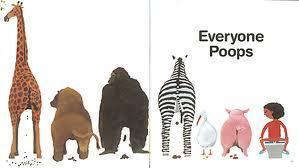
Sometimes we look different, sometimes we see things differently, but we’re pretty much the same.
There are so many different types of peace, and I didn’t learn them all at home! Some I struggle with even now– like “Career Peace”. My parents were blessed with career destinies. They were “called” to their jobs, and gifted with the talents to be great those jobs. They didn’t have to come to peace with the search, or find peace in their daily offerings, so they didn’t really teach how to do this. I’ve learned and I’m still learning what sort of impact I want to make on the world through my work, and what type of work will make me happy every day forever.

